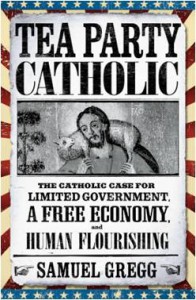Crisis Magazine‘s Gerald J. Russello has written a review of Tea Party Catholic, the new book from Acton’s Director of Research, Samuel Gregg. Russello outlines the premise of Gregg’s work:
Gregg has three competing stories to tell. First he wants to explain how a Catholic can responsibly defend limited government and the free market in accordance with Catholic teaching. This remains a crucial argument to make; since the 1980s, the welfare state has only expanded. As the financial and housing crises of 2008 show, many still look to government to control the economy, and bail out entire industries. Second, he wants to defend the substance of those teachings against both liberal Catholics and other sorts such as libertarians. Catholicism is not capitalism, and its defense of free-market exchanges and limited government is rooted in a certain view of the human person that is not the same as a secular liberal one. The Catholic view promotes human flourishing, but holds that flourishing must be consistent with the natural law and the ends of human life, such as the cultivation of virtue and the common good. Third, he wants to reconcile Catholicism specifically with the American form of republicanism. Gregg argues that the example of Catholics in America shows that the two are compatible, and that indeed the American experiment is consistent with the long tradition of Western liberty inaugurated by the Church.
Russello notes that Gregg utilizes the figure of Charles Carroll, the only Catholic signer of the Declaration of Independence, as the embodiment of “economic virtue and civic-mindedness.” In addition, Russello states that Gregg clearly understands modern Catholic thought regarding limited government and how modern Catholicism faces the issue of consumerism.
Tea Party Catholic therefore does a good job in updating the reason why Catholics should support the free market and limited government, and showing it is in line with both Vatican II and the more recent teachings of Popes John Paul II and Benedict XVI. However, more importantly, Gregg goes further. One possible criticism of the first generation of Catholic free market defenders had been that their criticisms of excessive government involvement had not been matched by criticism of consumerism, which has also drawn the ire of Catholic teaching. Gregg recognizes this issue, and notes that Catholic teaching, by stressing that the material world is good but not final, and that we are shaped by our moral choices, can serve as a bulwark against the equation of material good with moral worth.
Read “A Catholic Defense of Freedom” at Crisis Magazine.
Tea Party Catholic is scheduled for an October release and may be pre-ordered on Amazon.

